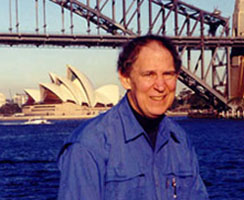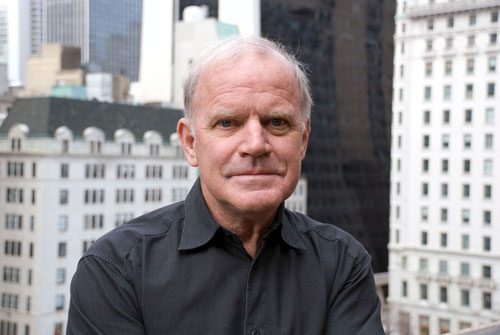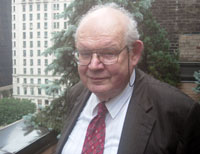INDIRECT RECIPROCITY, ASSESSMENT HARDWIRING, AND REPUTATION
A Conversation with Karl Sigmund
[December 2004]

These ideas fed into our work on indirect reciprocity, a concept that was first introduced by Robert Trivers in a famous paper in the 1970s. I recall that he mentioned this idea obliquely when he wrote about something he called "general altruism." Here, you give something back not to the person to whom you owe something, but to somebody else in society. He pointed out that this also works with regard to cooperation at a high level. Trivers didn't go into details, because at the time it was not really at the center of his thinking. He was mostly interested in animal behavior, and so far indirect reciprocity has not been proven to exist in animal behavior. It might exist in some cases, but ethologists are still debating the pros and cons.
In human societies, however, indirect reciprocity has a very striking effect. There is a famous anecdote about the American baseball player Yogi Berra, who said something to the effect of, "I make a point of going to other people's funerals because otherwise they won't come to mine." This is not as nonsensical as it seems. If a colleague of the university, for instance, goes faithfully to every faculty member's funeral, then the faculty will turn out strongly at his. Others reciprocate. It works. We think instinctively in terms of direct reciprocation—when I do something for you, you do something for me—but the same principle can apply in situations of indirect reciprocity. I do something for you and somebody else helps me in return.
[ Read... ]
WHAT IS REPUTATION?
A Conversation with Gloria Origgi
[November 2015]

That is basically what interests me—the double question of understanding our own biases, but also understanding the potential of using this indirect information and these indirect cues of quality of reputation in order to navigate this enormous amount of knowledge. What is interesting about the Internet, and especially about the Web, is that the Internet is not only an enormous reservoir of information, it is a reputational device. It means that it accumulates tons of evaluations of other people, so the information you get is pre-evaluated. This makes you go much faster. This is an evolutionary heuristic that we have, probably since the birth of the human mind.
Follow the people who know how to treat information. Don't go yourself for the solution. Follow those who have the solution. This is a super strong drive—to learn faster. Children know very well this drive. And, of course, it can bring you to conformism and have very negative side effects, but also can make you know faster. We know faster not because there is a lot of information around, but because the information that is around is evaluated; it has a reputational label on it.
[ Read... ]
MODELING THE FUTURE
A Conversation with Stephen Schneider
[March 2008]

Warming is unequivocal, that's true. But that's not a sophisticated question. A much more sophisticated question is how much of the climate Ma Earth, a perverse lady, gives us is from her, and how much is caused by us. That's a much more sophisticated, and much more difficult question.
[ Read... ]
EAT ME BEFORE I EAT YOU! A NEW FOE FOR BAD BUGS
A Conversation with Kary Mullis
[March 2010]

Now we are starting to work with organisms that are more likely to appear in a hospital, like staph and influenza, and we have our sights on Clostridium difficile, Pneumococcus aeruginosa, Acinetobacter baumannii, and an alarming number of other bacteria that are resistant to antibiotics. We are also working on influenza, which has a convenient little feature called M2e.
[ Read... ]
A BOZO OF A BABOON
A Conversation with Robert Sapolsky
[June 2003]

For the humans who would like to know what it takes to be an alpha man—if I were 25 and asked that question, I would certainly say competitive prowess is important—balls, translated into the more abstractly demanding social realm of humans. What's clear to me now at 45 is, screw the alpha male stuff, go for an alternative strategy. Go for the social affiliation, build relationships with females, don't waste your time trying to figure out how to be the most adept socially cagy male-male competitor. Amazingly enough, that's not what pays off in that system. Go for the affiliative stuff and bypass the male crap. I could not have said that when I was 25.
[ Read... ]
THE CLOCK OF THE LONG NOW
A Conversation with Stewart Brand
[November 1998]

In a sense, what we're doing with the clock is even more for time than what the photograph of the Earth did for space. Like understanding the earthly environment as one whole thing—we're trying to understand a period of time reaching 10,000 years into the past and 10,000 years into the future as one containable thought.
[ Read... ]
MIRROR NEURONS AND IMITATION LEARNING AS THE DRIVING FORCE BEHIND THE GREAT LEAP FORWARD IN HUMAN EVOLUTION
By V.S. Ramachandran
[May 2000]

The discovery of mirror neurons in the frontal lobes of monkeys, and their potential relevance to human brain evolution—which I speculate on in this essay—is the single most important "unreported" (or at least, unpublicized) story of the decade. I predict that mirror neurons will do for psychology what DNA did for biology: they will provide a unifying framework and help explain a host of mental abilities that have hitherto remained mysterious and inaccessible to experiments.
[ Read... ]
IS SHAME NECESSARY?
By Jennifer Jacquet
[July 2011]

Balancing group and self-interest has never been easy, yet human societies display a high level of cooperation. To attain that level, specialized traits had to evolve, including such emotions as shame.
[ Read... ]
PHILOSOPHY IN THE FLESH
A Conversation with George Lakoff
[March 1999]

We are neural beings. Our brains take their input from the rest of our bodies. What our bodies are like and how they function in the world thus structures the very concepts we can use to think. We cannot think just anything—only what our embodied brains permit.
[ Read... ]
A THEORY OF ROUGHNESS
A Conversation with Benoit Mandelbrot
[December 2004]

A recent, important turn in my life occurred when I realized that something that I have long been stating in footnotes should be put on the marquee. I have engaged myself, without realizing it, in undertaking a theory of roughness. Think of color, pitch, heaviness, and hotness. Each is the topic of a branch of physics. Chemistry is filled with acids, sugars, and alcohols; all are concepts derived from sensory perceptions. Roughness is just as important as all those other raw sensations, but was not studied for its own sake.
[ Read... ]
CHILDREN DON'T DO THINGS HALF WAY
A Conversation with Judith Rich Harris
[June 1999]

I'm prone to making statements like this one: how the parents rear the child has no long-term effects on the child's personality, intelligence, or mental health. I guess you could call that an extreme statement. But I prefer to think of myself as a defender of the null hypothesis.
[ Read... ]
SHOW ME THE SCIENCE
By Daniel C. Dennett
[August 2005]

Since there is no content, there is no "controversy'' to teach about in biology class. But here is a good topic for a high school course on current events and politics: Is intelligent design a hoax? And if so, how was it perpetrated?
[ Read... ]
COMPLEXITY AND CATASTROPHE
A Conversation with Sir John Maddox
[March 1997]

My guess is that if the question of human extinction is ever posed clearly, people will say that it's all very well to say we've been a part of nature up to now, but at that turning point in the human race's history, it is surely essential that we do something about it; that we fix the genome, to get rid of the disease that's causing the instability, if necessary we clone people known to be free from the risk, because that's the only way in which we can keep the human race alive. A still, small voice may at that stage ask, "But what right does the human race have to claim precedence for itself?" To which my guess the full-throated answer would be, "Sorry, the human race has taken a decision, and that decision is to survive. And, if you like, the hell with the rest of the ecosystem."
[ Read... ]
GAIA IS A TOUGH BITCH
A Conversation with Lynn Margulis
[November 2011]

How did the eukaryotic cell appear? Probably it was an invasion of predators, at the outset. It may have started when one sort of squirming bacterium invaded another—seeking food, of course. But certain invasions evolved into truces; associations once ferocious became benign. When swimming bacterial would-be invaders took up residence inside their sluggish hosts, this joining of forces created a new whole that was, in effect, far greater than the sum of its parts: faster swimmers capable of moving huge quantities of genes evolved. Some of these newcomers were uniquely competent in the evolutionary struggle. Further bacterial associations were added on, as the modern cell evolved.
[ Read... ]
THE EMERGENT SELF
A Conversation with Francisco Varela
[June 2001]

Why do emergent selves, virtual identities, pop up all over the place, creating worlds, whether at the mind/body level, the cellular level, or the transorganism level? This phenomenon is something so productive that it doesn't cease creating entirely new realms: life, mind, and societies. Yet these emergent selves are based on processes so shifty, so ungrounded, that we have an apparent paradox between the solidity of what appears to show up and its groundlessness. That, to me, is the key and eternal question.
[ Read... ]
CROSSING CULTURES
A Conversation with Mary Catherine Bateson
[October 2000]

I think of my daughter and myself as having been born in different countries. We were actually born 30 years apart in the United States of America. That means we were born into massively different cultural environments. What occurred to me, and this is something I've felt for a very long time, is that you can use what people learn in the home, especially from age differences, to deal with other kinds of diversity. After all, we learn more at home before we get to school than we learn in school. And we learn about the nature of learning, fundamental things about relationships, so that we need to be more systematic in using learning within the home for the insight it offers to understanding things outside the home. Including learning to learn, of course.
[ Read... ]
